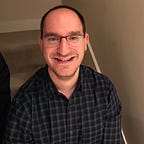Beyond the Hero’s Journey — The Information Architecture, and Craft, of Storytelling
The programme for the IA Summit 2016 has been announced. You should go, if you can.
Unfortunately, I didn’t get in. Which is a shame, but by no means the end of the road.
You see, I’ve been carting round a presentation based on a set of ideas for about three years, now. Each time a conference comes round, I refresh it. Indeed, the final version of it is going to get an airing at World IA Day London this weekend.
But now, I’d like to try something new. As discussed previously, I’m extremely interested in the structure of stories. For a while, I thought this was just me, but it turns out that people like Jason Mittell, who wrote an excellent book called ‘Complex TV: The Poetics of Contemporary Storytelling’, have been studying this kind of thing for a while.
What I’d like to do, is combine what I’ve learned from reading books like Jason’s, or Robert McKee’s, or FILMCRITHULK’s, and adapt that material, applying it to information architecture, user experience and the Web.
All I have at the moment is what I wrote for the submission to IA Summit, but if this sounds like something interesting, or if you’d like me to present it somewhere please do let me know, and I’ll develop it further.
“Everything is a story nowadays. We’re implored to consider the hero’s journey, not just the user’s journey. But do we really know what makes a story tick? Rather than applying the hallmarks of storytelling to user experiences, this session will go deep on the most pervasive information architecture there is — story itself. Why do you binge on those box sets? What makes you punch the air in delight? We’ll go beyond the three acts, the rise and fall, and examine how screenwriters structure narrative at a deeper level. How they carefully craft the revelation of information to an audience. What are the poetics of storytelling, and how do writers use so called ‘narrative special effects’ to keep you engaged? Drawing upon the work of screenwriting experts, critics and academics, as well as seven years of experience with narrative online, this talk will demystify the process of crafting a narrative, showing how information architecture and structured thinking can help us make sense of the stories we tell ourselves every day.”
“We’ll start off on familiar territory — how ‘storytelling’ has become almost a buzzword in marketing and other disciplines. This talk, though, is going to get geeky about the craft of screenwriting. I’ll describe Robert McKee’s definitions of the different elements of story craft — beats, scenes, sequences, acts. How the exchange of behaviour and information shapes a narrative, and how the notion of changing values gives rhythm to a story. To demonstrate this, I’ll provide examples of stories from shows like Parks and Recreation, Doctor Who and others, breaking down plots into their carefully crafted patterns. We’ll look at the work of Jason Mittell, and his notion of ‘complex TV’, explaining how the narratives we enjoy are becoming more complex, more networked. I’ll explain his concept of the different kinds of narrative events, ones which create forward momentum, and ones that promote speculation around hidden past events. Finally, we’ll also consider the work of narratologists and other thinkers, around how our minds work in terms of narrative and hyperlinks. I’ll show the information structure inherent in narratives, and explore the idea of the networked narrative too — how mythologies infiltrate our cultures, spilling out from fiction into reality, helping us make sense and interpret the world around us.”
“What you’ll learn: A deeper understanding of the craft of storytelling — A model for constructing narrative that will help convey a thematic rhythm — Knowledge of the different ways in which contemporary storytelling achieves its effects — An understanding of how information architecture lies at the heart of narrative, and how it shapes our understanding of, and engagement with, the real world.”
